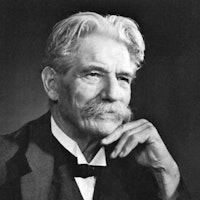The soul is a burning desire to breathe in this world of light and never to lose it—to remain children of light.
Albert Schweitzer

Children of Light
Topic: Truth, Law, & Principle
No one can give a definition of the soul. But we know what it feels like. The soul is the sense of something higher than ourselves, something that stirs in us thoughts, hopes, and aspirations which go out to the world of goodness, truth and beauty. The soul is a burning desire to breathe in this world of light and never to lose it—to remain children of light.
Albert Schweitzer was born on January 14, 1875, in Kaysersberg, Alsace, into a family deeply rooted in the traditions of religion, music, and education. Both his father and maternal grandfather were Lutheran ministers, and his early exposure to church life, theological study, and classical music shaped his intellectual and spiritual development. He pursued theology and philosophy at the University of Strasbourg, earning a doctorate in philosophy in 1899 with a focus on Immanuel Kant’s religious thought. In 1900, he received his licentiate in theology. His academic and pastoral work during this period included preaching at St. Nicholas Church and serving in leadership roles at the Theological College of St. Thomas. In 1906, he published The Quest of the Historical Jesus, a critical work that contributed to modern theological scholarship.
Alongside his theological and philosophical work, Albert Schweitzer was a gifted musician. He began studying piano and organ in childhood and was performing publicly by the age of nine. He went on to become an internationally known concert organist, using income from performances to fund both his education and later medical missions. As a musicologist, he published a biography of Johann Sebastian Bach in 1905 and contributed to the study of organ building and playing. In 1905, he made a pivotal decision to study medicine with the goal of becoming a medical missionary. He earned his medical degree in 1913 and soon after established a hospital in Lambaréné, French Equatorial Africa, where he and his wife later endured internment during World War I.
After returning to Lambaréné in 1924, Albert Schweitzer dedicated the remainder of his life to expanding and maintaining the hospital, which grew into a complex capable of treating hundreds of patients. He combined the roles of physician, surgeon, pastor, administrator, writer, and host, drawing on his wide range of training and experience. His written works during this time included On the Edge of the Primeval Forest and Civilization and Ethics. Schweitzer received several international honors, including the Goethe Prize and the 1953 Nobel Peace Prize. The prize money supported the establishment of a leprosarium at Lambaréné. Albert Schweitzer died there on September 4, 1965, leaving behind a legacy grounded in service, scholarship, and what he called “Reverence for Life.”
Reverence for Life
Schweitzer, Albert. Reverence for Life. Harper & Row, 1969. [Albert Schweitzer (Reverence for Life: The Words of Albert Schweitzer)].

Albert Schweitzer
Theme: The Light of Truth

Commentary About Albert Schweitzer’s Quote [Short intro]
Albert Schweitzer’s reflection on the soul reveals its connection to the theme of living as “children of light.” He describes the soul as a sense of “something higher than ourselves,” stirring aspirations toward “goodness, truth, and beauty.” This stirring reflects the soul’s role in guiding us toward lives illuminated by higher values. By presenting the soul as an internal compass, Schweitzer highlights its call to live with clarity and purpose, aligned with universal principles.
Schweitzer’s image of the soul as a “burning desire” to remain in the “world of light” underscores the active nature of living as children of light. This way of being requires openness, humility, and a readiness to engage with the truths that wisdom reveals. For Schweitzer, this seeking is not a finite journey but a continuous process of aligning with truth and goodness. To be children of light is to live with a childlike openness to growth and transformation, embracing the light’s guidance.
Schweitzer’s insights call us to embody the ideals of truth, goodness, and beauty through the soul’s aspirations. By inviting us to “breathe in this world of light,” he emphasizes that living as children of light is both a personal and shared human pursuit. It is a way of being that reflects a conscious effort to live with clarity and purpose, in harmony with the higher values that illuminate life.
Additional Albert Schweitzer Quotes
Resources
Related Quotes
Copyright © 2017 – 2026 LuminaryQuotes.com About Us